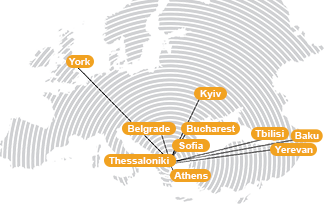Mr. Zaharis, SEERC Director & Dr Prodromidou, SEERC Research Assosiate, participated in the panel of the Global Forum on Law, Justice and Development Week 2016 Session on “Forced Displacement: From Aid-Dependence to Self-Reliance” on December 8, 2016.
Along with the other panel members:
- Dr. Mirjana Stankovic, Senior Legal Consultant, Global Forum on Law, Justice and Development, the World Bank (moderator);
- Dr. Elizabeth Ferris, Research Professor, Georgetown University’s School of Foreign Service;
- Dr. Michael Clemens, Senior Fellow, Center for Global Development;
- Dr. Sebastián Albuja, Senior Program Manager, American Bar Association’s Rule of Law Initiative (ABA ROLI);
- Dr. Demetrios G. Papademetriou, Distinguished Senior Fellow and President Emeritus, Migration Policy Institute (MPI);
After providing an overview of the latest legal and policy developments aimed towards creating linkages between humanitarian and development actors, the session addressed the concept of Survival Migration; next, it explored the drivers and dynamics of forced migration not fully included in the international protection regime, such as the effects of climate change—including slow-onset and sudden-onset disasters—intense criminal violence, state fragility, and attendant protracted internal armed conflicts; and it then presented the scale, trends, responses and governance challenges regarding the migrants and the forcibly displaced in Europe.






